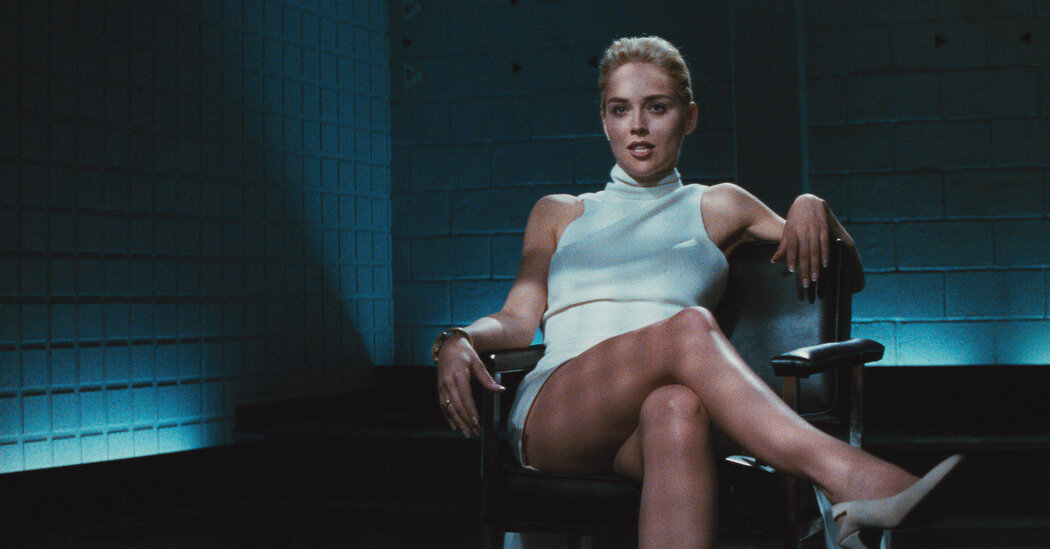

Curran brings her in for questioning, resulting in the film’s most famous (and most frequently parodied) sequence: an interrogation in which Tramell uses her feminine wiles and lack of undergarments to fully intimidate every man in the room. (In her memoir, Stone said she was tricked into the scene’s immediately notorious frontal nudity.) Clad in a sleek white dress, her icy blond hair pulled back tight, Stone is the very picture of the ’90s-era femme fatale; she lights up a cigarette, and when she’s warned that smoking is prohibited, she replies, sinfully, “What are you gonna do, charge me with smoking?”
Her back-and-forth with Curran isn’t exactly James M. Cain, but it’s played the right way: Douglas steams and stammers, a typical film noir heel, while Stone delivers her dialogue with the devilish gleam of a sly actor having a great time. It’s easy to see how the picture made her a star — and how it would have failed without her, both in terms of her outrageous beauty (the entire film hinges on the belief that Curran would literally risk his life to get into her bed) and her deft playing.
Without the dazzle of Stone’s performance, there’s not much of lasting worth in “Basic Instinct.” It’s so overwrought in its execution — the showiness of Jan de Bont’s camerawork, the thundering strings of Jerry Goldsmith’s score, the absurd plotting of the Eszterhas screenplay — that it almost plays like a goof. (And maybe it is; many critics, then and now, missed the satirical angles of Verhoeven’s dystopian sci-fi films “RoboCop” and “Starship Troopers.”) In the film’s embrace and amplification of the conventions of suspense thrillers, Verhoeven steps into the “Dressed to Kill” director Brian De Palma’s territory. But like De Palma, Verhoeven has some trouble overcoming the ugliest aspects of his story.
After all, protesters were not wrong about its offenses. The lipstick lesbian material is played solely for the straight thrills of the male gaze, while bisexuality is framed as a symptom of mental instability, if not outright psychopathy; the cruelty with which Curran treats Roxy (Leilani Sarelle), Tramell’s girl on the side, is played for crowd-pleasing, homophobic laughs (“Tell me something, Rocky, man to man”). And the scene in which Curran escalates consensual rough sex with Dr. Garner to explicitly nonconsensual assault is inexcusable and abhorrent, not only for the way we continue to see an unapologetic date rapist as a sympathetic protagonist, but also for how it is shrugged off afterward (by both perpetrator and victim) as a byproduct of the heat of the moment.
Perhaps that, then, is the value of “Basic Instinct”: as a time capsule. It speaks volumes about its era, and the strides (minuscule though they may seem) that we’ve made since, that such a reprehensible character as Nick Curran was intended as an audience surrogate, the good guy of a big-budget thriller, simply because he was a straight, white, male cop.
Or maybe there’s a more direct contrast to note. In the April 28, 1992, issue of The Village Voice, an attack on the film by the writer C. Carr was published alongside a defense of it from the eminent critic Amy Taubin, who “thought it was a gas to see a woman on the screen in a powerful enough position to let it all hang out and not be punished for it in the end.”
Moreover, it’s not just that it was novel, in 1992, to see a female character framed as unapologetically and frankly sexual; it’s that it’s still uncommon now. And so is the notion of a major motion picture made by, for and about adults, messy, imperfect and insensitive though they may be. “Basic Instinct” is a leftover from an era when filmmakers, even working with big budgets, could take big risks. It makes this slick, provocative dirty movie something its creators could have never imagined: quaint.
